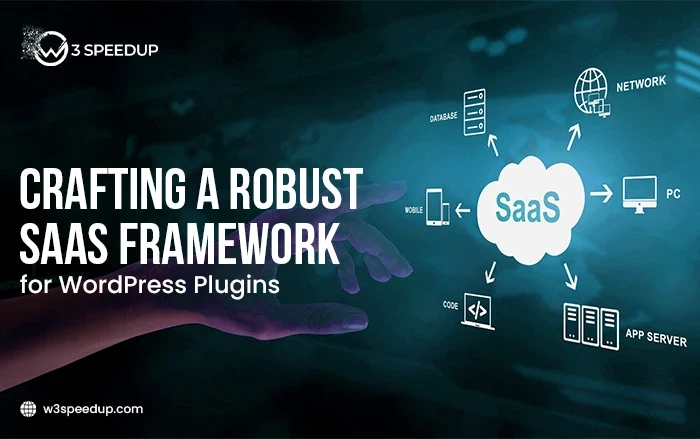WordPress, commanding over 40% of the internet, has transformed into a multifaceted content management system (CMS) replete with a sprawling plugin ecosystem. As the demand for sophisticated and specialized plugins burgeons, developers are increasingly gravitating toward Software as a Service (SaaS) models. In this discourse, we shall delve into the pivotal considerations and procedural steps integral to constructing a formidable and scalable SaaS framework tailored for WordPress plugins.
SaaS framework for WordPress plugins: key factors & steps
 1. Appreciating the Imperative of Scalability
1. Appreciating the Imperative of Scalability
Scalability stands as an imperative facet in the development of SaaS platforms for WordPress plugins. As user traction intensifies, the platform must gracefully navigate the surge in traffic, data, and transactions. Scalability, therefore, assumes the mantle of ensuring that the application can organically expand and adapt to evolving demands without compromising its operational prowess. In the context of WordPress plugins, scalability is paramount for accommodating a spectrum of websites characterized by distinct sizes and complexities.
In order to fortify SaaS development initiatives and guarantee a seamless scalability, it is essential for organizations to enlist the expertise of seasoned SaaS developers. Discover the requisite proficiency at https://lemon.io/hire-saas-developers/
 2. Discerning Target Audience and Use Cases
2. Discerning Target Audience and Use Cases
Prior to embarking on the development journey, a judicious understanding of the target audience and use cases for the SaaS platform is imperative. This comprehension guides the development of features, facilitating the creation of a bespoke solution. For instance, a SaaS platform for SEO plugins might hone in on analytics, keyword tracking, and performance optimization, while an e-commerce plugin SaaS could pivot around inventory management, order processing, and seamless integration with payment gateways.
 3. Forging a Nimble Architecture
3. Forging a Nimble Architecture
The bedrock of scalability often rests upon the architecture of the SaaS platform. Embracing a microservices architecture augments flexibility and modularity. Each microservice is dedicated to a specific function, simplifying the process of scaling individual components as required. In the realm of WordPress plugins, microservices can be strategically designed to cater to diverse plugin functionalities, engendering a more resilient and adaptive system.
 4. Seamless Integration with WordPress
4. Seamless Integration with WordPress
A triumphant SaaS platform for WordPress plugins seamlessly integrates with the WordPress ecosystem. This entails furnishing user-friendly APIs for plugin developers, ensuring compatibility across various WordPress versions, and upholding a cohesive user interface. Compatibility and integration are pivotal, fostering a harmonious user experience and fostering adoption within the expansive WordPress community.
 5. Enforcing a Stalwart Authentication and Authorization System
5. Enforcing a Stalwart Authentication and Authorization System
Security is non-negotiable in SaaS development. The implementation of a robust authentication and authorization system serves as a bulwark, allowing only authorized users access to the platform and its features. In the context of WordPress plugins, this assumes critical significance, especially when dealing with sensitive data or integrations with services demanding secure authentication.
 6. Crafting an Intuitive Dashboard
6. Crafting an Intuitive Dashboard
The user experience constitutes a linchpin for the triumph of any SaaS platform. Designing an intuitive dashboard that offers users a lucid overview of their plugin’s performance and features is paramount. For WordPress plugin SaaS, the dashboard should seamlessly dovetail with the WordPress admin interface, maintaining a consistent and familiar user experience.
 7. Implementation of Subscription Management
7. Implementation of Subscription Management
Scalable SaaS platforms often pivot around subscription-based models. Implementing a robust subscription management system assumes pivotal importance for managing payments, facilitating upgrades, downgrades, and controlling user access. In the realm of WordPress plugin SaaS, users may subscribe to varied feature sets based on their unique requirements.
 8. Harnessing Cloud Services
8. Harnessing Cloud Services
Cloud services proffer a scalable infrastructure capable of adapting to evolving demands. Leveraging platforms such as AWS, Azure, or Google Cloud amplifies the scalability of the SaaS platform. These services provide on-demand resources, allowing the platform to scale horizontally by introducing additional instances to deftly distribute the load.
 9. Monitoring and Analytics
9. Monitoring and Analytics
To ensure sustained scalability, the infusion of monitoring and analytics tools into the SaaS platform is imperative. These tools meticulously track performance, user behavior, and system health, proffering invaluable insights for optimization. For WordPress plugin SaaS, analytics aid developers in comprehending the utilization of their plugins, informing decisions pertaining to feature enhancements and refinements.
 10. Continuous Testing and Iteration
10. Continuous Testing and Iteration
Constructing a scalable SaaS platform is an iterative process that mandates perpetual testing and refinement. Regular updates and improvements based on user feedback, technological advancements, and dynamic market trends are indispensable. In the context of WordPress plugins, staying abreast of the latest WordPress releases and community trends guarantees sustained relevance and adoption.
Final words
In the dynamic milieu of WordPress plugin development, the adoption of a scalable SaaS model assumes paramount significance. Developers must prioritize flexibility, seamless integration, security, and user experience to engineer platforms that seamlessly align with the diverse needs of the expansive WordPress user base. By adeptly navigating the intricacies of both SaaS development and the intricate WordPress ecosystem, developers can forge scalable solutions that stand as a testament to the ever-evolving domain of website customization and functionality.
 Christmas Mega Sale – Enjoy Up to 50% OFF on Every Plan!
Christmas Mega Sale – Enjoy Up to 50% OFF on Every Plan! 


